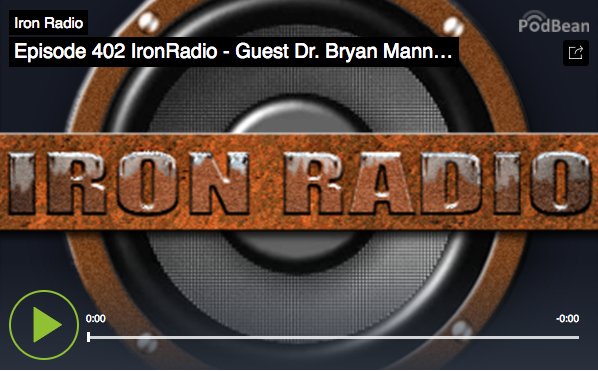
Dr. Bryan Mann is widely considered to be the leading expert in velocity-based training. Not only has he pioneered research in this area and written extensively on the topic, but he is also heavily recruited to speak at conferences and be a guest on podcasts and panels, sharing his knowledge and implementation of VBT.
This week Dr. Mann appeared on Episode 402 of Iron Radio to discuss velocity-based training with Dr. Lonnie Lowery and his co-hosts. The podcast begins with the Iron Radio hosts following up on topics from previous episodes, answering questions from readers, and sharing a news update. They discuss ketogenic dieting at length, as well as covering questions about education in exercise physiology, training differences for female athletes, and heart rate variability.
Dr. Mann joins in the second half, 35 minutes into the podcast. He begins by giving his background in training and strength and conditioning, including the story of how he started training in his youth in response to being made fun of for a birthmark on his face. In high school, he became involved in the sport of powerlifting, and then transitioned into strength and conditioning. Dr. Mann then bounced around at various strength and conditioning positions until eventually leaving the coaching side to focus on other work as a faculty member.
RECENT: Seek First to Understand
They then discuss Dr. Mann's dissertation research on APRE and the study that he conducted comparing APRE to linear periodization. Dr. Mann explains the origins of VBT and launches into a discussion about the usefulness of measurement and of providing objective feedback for the athletes in the form of speed measurement. These measurements not only help educate athletes on their speed and motivate them to focus on explosiveness, but it can also lead to direct increase in velocity, which Dr. Mann notes is a neuro-capability.
They close the podcast by discussing the finer details of using velocity-based training and the challenge of traditional percentage-based dynamic effort training. Explosiveness and strength are not always stable from day to day, and Dr. Mann explains how variances in daily performance can take a light weight that is meant to be moved explosively, and cause it to slow down, removing the velocity benefits of the training session. This is why a focus on the speed of the bar is more important than the weight being used, which is a major component of VBT.
LISTEN
By the minute:
- (0:40) Guest introduction
- (2:40) Q&A session
- (5:47) Amino acid differences in whey protein powders
- (8:00) Nervous system tricks
- (13:48) Research on training for female athletes
- (17:50) Speed emphasis for female athletes
- (20:56) Heart rate variability
- (29:20) Diet-induced adaptations
- (35:10) Dr. Mann introduction and background
- (40:30) APRE research compared to linear periodization
- (46:10) Implementation of APRE
- (51:42) How Dr. Mann got into VBT
- (57:57) Feedback and measurement as objective external cues
- (1:01:50) The downfalls of percentage-based dynamic work
- (1:07:20) Main benefits of VBT and closing remarks
From the host:
How explosive are you? Can you program around it? After the usual listener mail and news, the guys get insights. The episode begins with follow-up answers to last week's whey protein question and some discussion on monitoring ketogenic diets. In fact, ketogenic diets get repeated attention this week. After the mid-show break, Dr. Mike T Nelson leads an interview on velocity-based training and other topics with academic, strength coach, and NSCA enthusiast Dr. Bryan Mann. If you're curious about ideas to steer and motivate your training program, there are some gems in this extra-long episode.











